How Antioxidants Protect Emotional Well-being: The Hidden Link Between Oxidative Stress and Mental Health
Introduction
When we think about antioxidants, most of us picture glowing skin, slowing aging, or boosting immunity. But there’s a much deeper story happening behind the scenes — one that reaches all the way into your brain, emotions, and sense of calm.
Emerging science shows that oxidative stress, the damage caused by free radicals, doesn’t just affect your physical health — it also plays a major role in mood, resilience, and emotional stability.
In fact, many of the symptoms we associate with anxiety, depression, and fatigue are connected to oxidative damage in the brain.
The good news? Antioxidants — from food, supplements, and lifestyle habits — can help protect your mind from that damage, supporting both mental clarity and emotional strength. 🌞
Let’s explore how antioxidants work, how oxidative stress impacts your mood, and how to build a brain-protective lifestyle from the inside out.
Looking for supplements for Emotional Well-Being? Click here.
⚡ What Are Antioxidants, Exactly?
To understand antioxidants, we first need to understand their enemy: free radicals.
Free radicals are unstable molecules produced naturally by metabolism, stress, and environmental exposure (like pollution, poor diet, or toxins). They’re missing an electron, so they “steal” one from nearby cells — damaging DNA, proteins, and lipids in the process.
Your body produces antioxidants to neutralize these free radicals, keeping them in balance. But when that balance is disrupted — a state called oxidative stress — inflammation and cellular damage increase, particularly in the brain.
Antioxidants work by donating electrons to free radicals, stabilizing them without becoming harmful themselves. In short, they are your body’s cleanup crew — repairing, protecting, and preventing deeper stress on your cells.
🧬 Think of antioxidants as emotional bodyguards for your brain cells.
🧠 The Brain: A Major Target for Oxidative Stress

Your brain is only about 2% of your body’s weight but consumes over 20% of your oxygen and energy. That makes it especially vulnerable to oxidative stress.
When free radicals accumulate in the brain, they can:
Damage neurons (nerve cells).
Reduce neurotransmitter activity (like serotonin and dopamine).
Impair mitochondrial function (the cell’s energy engine).
Increase inflammation in neural tissue.
Over time, this can lead to cognitive fog, emotional instability, and even long-term mental health conditions.
In other words: oxidative stress doesn’t just age your body — it ages your emotions. 🌿
🌪️ Oxidative Stress and Emotional Imbalance
The Inflammation–Mood Connection
When oxidative stress rises, it triggers inflammation, releasing cytokines that affect brain chemistry. Chronic inflammation can reduce serotonin levels and impair neuroplasticity — two key factors in emotional resilience.
Research shows that people with depression, anxiety, and PTSD often exhibit elevated markers of oxidative stress and lower levels of natural antioxidants like glutathione and vitamin E.
🧩 This suggests that antioxidant depletion may leave the brain more vulnerable to emotional dysregulation.
Oxidative Stress and Neurotransmitters
Free radicals can interfere with the production and function of mood-related neurotransmitters:
Serotonin (happiness and calm)
Dopamine (motivation and reward)
GABA (relaxation)
When these systems falter, emotions become unpredictable. You may feel anxious, unmotivated, or emotionally numb.
Antioxidants protect these pathways by keeping the neurons that produce and transmit neurotransmitters healthy.
Mitochondria: The Energy–Emotion Connection
Mitochondria power every cell, including those in your brain. When oxidative stress damages mitochondria, energy production drops — leading to fatigue, brain fog, and low mood.
Antioxidants like CoQ10, alpha-lipoic acid, and N-acetyl cysteine (NAC) help restore mitochondrial health, improving both physical energy and emotional stability.
💡 Your energy and emotions share the same cellular engine.
Looking for supplements for Emotional Well-Being? Click here.
🌈 The Brain–Body Connection: How Stress Fuels Free Radicals
When you experience psychological stress, your body releases cortisol and adrenaline — useful for short-term survival but harmful in excess.
Chronic stress increases oxidative stress by:
Raising blood sugar (which fuels free radical production).
Disrupting sleep and mitochondrial recovery.
Depleting key antioxidants like glutathione and vitamin C.
In other words, emotional stress and oxidative stress are intertwined.
The more you stay in fight-or-flight mode, the more your cells suffer — and the harder it becomes to regulate your emotions.
This is why managing oxidative damage isn’t just about diet — it’s about how you live, breathe, and recover. 🌿
💞 Antioxidants and Emotional Resilience
Resilience isn’t only psychological — it’s biochemical. Antioxidants strengthen the foundation that allows your nervous system to stay balanced during stress.
Here’s how:
Protect neurons from oxidative damage.
Support neurotransmitter balance.
Improve mitochondrial function.
Reduce neuroinflammation.
Enhance neuroplasticity — the brain’s ability to adapt and recover from trauma or stress.
These effects combine to make you not just calmer but also emotionally stronger.
🌸 You can’t separate emotional wellness from cellular wellness.
🍇 Key Antioxidants for Brain and Mood
Let’s explore the nutrients and compounds most crucial for emotional protection.
🧄 Glutathione – The Master Antioxidant
Glutathione is your body’s most powerful natural antioxidant. It regenerates other antioxidants like vitamin C and E while detoxifying harmful molecules.
Low glutathione levels are linked to depression, anxiety, and neurodegenerative diseases.
🪷 How to boost it:
Eat cruciferous vegetables (broccoli, kale, cauliflower).
Supplement with N-acetyl cysteine (NAC) — a proven glutathione precursor.
Get enough sleep and magnesium (both support glutathione recycling).
🍊 Vitamin C – The Stress Shield
Vitamin C isn’t just for colds — it plays a major role in the adrenal glands, which produce cortisol. Chronic stress depletes vitamin C reserves, increasing vulnerability to oxidative stress.
It also helps synthesize serotonin and dopamine, directly influencing mood.
🪶 Best sources:
Citrus fruits 🍋
Bell peppers 🫑
Berries 🍓
Kiwi and broccoli 🥦
🌻 Vitamin E – The Cellular Protector
Vitamin E prevents oxidative damage to cell membranes, especially in the brain’s fatty tissues.
Deficiency has been linked to cognitive decline and mood disorders.
🌞 Best sources: nuts, seeds, avocado, olive oil.
🧠 Coenzyme Q10 (CoQ10) – The Energy Enhancer
CoQ10 fuels mitochondria and reduces oxidative stress in neural tissue.
Supplementation has been shown to improve mood, reduce fatigue, and enhance motivation.
💊 Best form: ubiquinol (the active form).
🍄 Alpha-Lipoic Acid (ALA)
ALA regenerates other antioxidants and protects neurons from free radical damage. It also improves insulin sensitivity, stabilizing blood sugar — which directly impacts mood stability.
🌿 Food sources: spinach, broccoli, organ meats, and supplements.
🌾 Polyphenols – Nature’s Brain Protectors
Found in colorful plants, polyphenols (like flavonoids) reduce inflammation and support blood flow to the brain.
💐 Examples:
Green tea (EGCG) 🍵
Blueberries 🫐
Dark chocolate 🍫
Turmeric (curcumin) 🌿
These plant compounds even enhance BDNF (Brain-Derived Neurotrophic Factor) — a protein that promotes neuroplasticity and emotional resilience.
“Food that feeds your cells also feeds your mood.” 🌸
🌰 Omega-3 Fatty Acids
While not antioxidants in the traditional sense, omega-3s work synergistically by reducing inflammation and protecting neurons from oxidative stress.
EPA and DHA are particularly crucial for serotonin and dopamine function.
🐟 Sources: salmon, sardines, flaxseed, chia, algae oil.
Looking for supplements for Emotional Well-Being? Click here.
🌬️ Breath, Movement, and Mind: Lifestyle Antioxidants

Antioxidant protection isn’t limited to what you eat — it’s also what you practice.
🧘 Mindful Breathing
Deep breathing improves oxygen flow and reduces oxidative stress by calming the HPA axis.
Every slow exhale signals safety, lowering free radical formation from chronic stress.
🌿 Try: 4-6 breathing (inhale 4, exhale 6) for 5 minutes daily.
Want to try Breathwork? Click Here.
🌳 Exercise — The Oxidative Paradox
Moderate exercise briefly increases free radicals, but triggers a rebound effect — stimulating your body to produce more internal antioxidants over time.
🏃 Think of it as “antioxidant training” for your cells.
Too little movement = stagnation.
Too much = depletion.
Find your balance.
🌞 Sunlight and Sleep
Sunlight boosts melatonin, which doubles as a potent antioxidant in the brain.
Adequate sleep allows the brain to “clean” itself via the glymphatic system, clearing out free radicals and toxins.
🌙 Poor sleep = accumulated oxidative stress = low mood.
💞 Connection and Gratitude
Positive social bonds and gratitude practices lower inflammatory cytokines and oxidative markers.
They also increase oxytocin, a hormone that promotes calm and counteracts cortisol.
In essence: love, kindness, and gratitude are biochemical antioxidants. ❤️
🧬 The Antioxidant–HPA Axis Link
Remember the HPA axis (hypothalamus-pituitary-adrenal system)? It regulates cortisol, your main stress hormone.
When oxidative stress rises, it overstimulates the HPA axis, leading to chronically high cortisol levels.
Antioxidants help by:
Reducing oxidative damage in the hypothalamus.
Supporting adrenal recovery.
Restoring feedback sensitivity so cortisol levels normalize.
🪷 The result? Less anxiety, better sleep, and improved emotional regulation.
🌺 Antioxidants, Neuroplasticity, and Healing
Antioxidants don’t just protect — they restore.
They support neuroplasticity — your brain’s ability to form new connections after stress or trauma.
Oxidative stress impairs neuroplasticity, making it harder to learn new habits or release old emotional patterns.
By reducing oxidative load, antioxidants make your brain more adaptable, hopeful, and resilient — the biological foundation of emotional growth. 🌿
💊 Antioxidant Supplements for Emotional Wellness
While food is foundational, targeted supplements can provide extra support for the brain’s antioxidant defenses.
| Supplement | Function | Recommended Form |
|---|---|---|
| N-Acetyl Cysteine (NAC) | Boosts glutathione, supports mood | 600–1200 mg/day |
| CoQ10 | Mitochondrial support, anti-fatigue | Ubiquinol 100–200 mg/day |
| ALA (Alpha-Lipoic Acid) | Regenerates antioxidants | 200–600 mg/day |
| Curcumin | Reduces inflammation and brain stress | With black pepper or liposomal |
| Vitamin C | Lowers cortisol, supports serotonin | 500–1000 mg/day |
| Vitamin E (Mixed Tocopherols) | Protects cell membranes | 200–400 IU/day |
Always consult a healthcare provider if you’re taking medications, as antioxidants can influence drug metabolism.
🌿 Mind-Body Integration: Emotional Healing as Cellular Healing
Modern neuroscience confirms what ancient wisdom always knew:
Your emotional state reflects your cellular environment.
When oxidative stress dominates, you feel tired, tense, or reactive.
When antioxidant systems thrive, you feel clear, calm, and connected.
Antioxidants literally give your brain room to breathe.
🪶 Through food, breath, rest, and connection, you can reduce the invisible chemical noise that clouds both mind and mood.
🧘 Daily Rituals for Emotional Protection
Here’s a simple antioxidant-based routine to nurture both your brain and emotions:
🌤️ Morning
Drink water with lemon (vitamin C kick).
Eat a colorful breakfast (berries, oats, nuts).
Get sunlight exposure for 10 minutes.
🕐 Afternoon
Take a 15-minute movement break or mindful walk.
Hydrate with green tea or herbal infusion.
Practice 2–3 deep-breathing cycles.
🌙 Evening
Include omega-3 or NAC if supplementing.
Enjoy a veggie-rich dinner with olive oil.
Journal one gratitude reflection to activate positive neurochemistry.
🪷 Resilience is built meal by meal, breath by breath.
🌞 The Big Picture: Oxidative Calm
Antioxidants are not just nutrients — they are symbols of balance.
They teach us that healing isn’t about eliminating every challenge; it’s about maintaining inner harmony when life becomes reactive.
Every mindful choice — a nutritious meal, a deep breath, a restful night — is an antioxidant in motion, restoring equilibrium to your body and peace to your mind.
“When you protect your cells from chaos, you protect your soul from collapse.” 🌸
Your emotional well-being begins at the microscopic level — and antioxidants are your quiet, daily guardians of calm.
Looking for online therapy ? Click Here.
📚 References
Maes, M. et al. (2011). The oxidative and nitrosative stress pathways in depression and anxiety. Progress in Neuro-Psychopharmacology.
Ng, F. et al. (2008). Oxidative stress in psychiatric disorders. Journal of Affective Disorders.
Berk, M. et al. (2013). N-acetyl cysteine as a treatment for oxidative stress-related mood disorders. Biological Psychiatry.
Allen, J. D. et al. (2018). Antioxidants and the brain: Protective roles in stress and neuroinflammation. Frontiers in Neuroscience.
Dantzer, R., et al. (2008). Inflammation and depression: An integrated view. Nature Reviews Neuroscience.
Harrison, N. A. et al. (2017). The inflammation–cognition–emotion link. Trends in Cognitive Sciences.
Lopresti, A. L. (2019). The dietary and nutrient basis of emotional well-being. Nutrients.
Halliwell, B. (2006). Oxidative stress and neurodegeneration: where are we now? Journal of Neurochemistry.
Meyer, T. et al. (2020). Psychological stress, oxidative damage, and antioxidant status. Brain, Behavior, and Immunity.
Firth, J. et al. (2021). Nutritional psychiatry and antioxidants in mental health. World Psychiatry.
Related Posts
-

Nootropics That Promote Calm and Rest
Explore the world of calming nootropics — natural brain enhancers that promote relaxation, better focus, and deeper rest. Learn how L-Theanine, magnesium, ashwagandha, and other adaptogens help balance your nervous system, reduce stress, and support restorative sleep.
-

Best Natural Supplement Stack for Sleep
Discover the best natural supplement stack for deep, restorative sleep. Learn how nutrients like magnesium, L-theanine, glycine, and calming herbs such as chamomile and ashwagandha work together to relax your body, calm your mind, and improve sleep quality—naturally and safely.
-

Combining L-Theanine and Magnesium for Sleep: A Calm Night, Naturally
Discover how combining L-Theanine and Magnesium can help you drift into deep, restorative sleep. Learn how this natural duo calms the mind, relaxes the body, and supports your nervous system—without grogginess the next morning.
-

How to Sleep Better After Intense Workouts
Struggling to fall asleep after a tough workout? Learn how to optimize your post-training recovery with nutrition, hydration, and science-backed sleep strategies. Discover how to calm your nervous system, balance hormones, and wake up fully recharged for your next session.
-

Ashwagandha and Valerian: A Bedtime Combo for Deep Rest and Emotional Reset
Discover the calming synergy of Ashwagandha and Valerian root, two natural sleep aids that help quiet the mind, ease anxiety, and promote deeper rest. Learn how this herbal duo supports the nervous system, balances stress hormones, and restores emotional peace — without next-day grogginess.
-

How to Create a Resilience-Boosting Diet
Discover how to build emotional and physical strength from the inside out with a resilience-boosting diet 🍎. Learn which foods stabilize your mood, how supplements like magnesium and omega-3s strengthen your stress response, and why pairing nutrition with breathwork and therapy creates lasting calm, focus, and vitality 🌿💪.
-

Best Teas and Herbal Blends for Calmness: Nature’s Way to Restore Inner Peace
Ashwagandha, the ancient adaptogenic herb, helps your body find balance during stress. Known as “Indian ginseng,” it supports cortisol regulation, boosts energy, and restores calm clarity. Discover how this powerful root promotes resilience, emotional balance, and steady vitality — one cup at a time. 🌸
-

Parenting and Emotional Strength: How to Raise Children Without Losing Yourself
Empathy is the bridge that connects hearts — the quiet power to understand, feel, and support another’s emotions without judgment. Learn how empathy strengthens relationships, enhances communication, and cultivates deeper compassion in everyday life. 🌿
-

How to Bounce Back from Public Failure: Reclaiming Confidence, Purpose, and Power
Visualization is more than imagination — it’s brain training for resilience. By picturing calm, success, or healing, you activate the same neural pathways as real experience. Learn how daily visualization rewires your brain for confidence, emotional balance, and recovery from stress. ✨
-

Coping with Financial Stress Through Resilience: How to Stay Grounded When Money Feels Tight
Body awareness is the foundation of emotional resilience. By tuning into your body’s signals — tension, fatigue, or calm — you learn to recognize stress before it overwhelms you. Discover how mindfulness, gentle movement, and breathwork can deepen your connection with your body and restore balance from the inside out. 🧘
-

How to Stay Positive During Chronic Illness: A Guide to Emotional Strength and Hope
Creativity is more than art — it’s a form of healing. Whether through painting, writing, music, or small acts of expression, creativity helps release emotion, calm the nervous system, and reconnect you to joy. Discover how to use creativity as a tool for emotional balance, resilience, and self-discovery. 🌿
-

Resilience Tips for Caregivers: How to Stay Strong While Caring for Others
Joy isn’t the absence of pain — it’s the quiet strength to find light even in challenging times. Cultivating joy through small daily moments restores balance, releases stress, and reminds you of life’s beauty. Learn how to reconnect with authentic happiness, rebuild emotional energy, and nurture your nervous system through gratitude, presence, and play. 🌿
-

Building Resilience After a Breakup: How to Heal, Rebuild, and Rise Stronger
Social connection is one of the strongest predictors of emotional resilience. During difficult times, genuine relationships act as anchors — calming the nervous system, reducing stress hormones, and helping you regain perspective. Learn how cultivating real human connection can strengthen your mind, heart, and overall well-being. 🌿
-

How to Stay Emotionally Strong During Job Loss
Your emotions are powered by brain chemistry — a delicate balance of neurotransmitters like serotonin, dopamine, and cortisol. When these chemicals work in harmony, you feel calm, focused, and resilient. Learn how daily habits, nutrition, and mindfulness can support your brain chemistry and boost emotional well-being naturally. 🌿
-

The Role of Hormones in Emotional Stability: How Your Chemistry Shapes Your Calm
Hormones shape more than your body — they shape your emotions, resilience, and sense of calm. From cortisol to serotonin, these chemical messengers influence how you react to stress, connect with others, and recover from challenges. Learn how to balance your hormones naturally to build lasting emotional stability and harmony within. 💫
-

Mitochondria and Emotional Energy: The Cellular Power Behind Your Mood
Breathwork is one of the most powerful tools for emotional regulation and cellular balance. Through intentional breathing, you can calm your nervous system, increase oxygen flow to the brain, and even support mitochondrial energy. Learn how conscious breathing connects body and mind — transforming stress into presence and emotional strength. 🌿
-

Inflammation and Its Impact on Mood Resilience: The Silent Link Between Body and Mind
Inflammation doesn’t just affect the body — it impacts the mind. Chronic inflammation alters brain chemistry, depletes serotonin, and makes emotional recovery harder. Learn how calming inflammation through nutrition, mindfulness, and sleep can restore balance, resilience, and a renewed sense of emotional strength. 💫
-

The HPA Axis and Emotional Health: The Hidden Bridge Between Stress and Mind
Neuroplasticity — the brain’s ability to rewire and adapt — is the foundation of emotional healing and resilience. When you face stress, trauma, or change, your neural pathways can reshape themselves to support new patterns of calm, focus, and self-awareness. Learn how daily practices like mindfulness, therapy, and breathwork strengthen neuroplasticity to transform emotional pain into personal growth. 🌸
-

Why Cortisol Control Is Key to Resilience: Mastering Stress to Build Emotional Strength
Controlling cortisol — the body’s main stress hormone — is the secret to lasting resilience. When cortisol levels stay balanced, your mind becomes clearer, emotions steadier, and energy more sustainable. Learn how breathwork, mindset shifts, adaptogens, and daily rhythms can help you calm your stress response and build true inner strength. 🌞💪
-

Dopamine’s Influence on Motivation and Recovery: Reigniting Drive and Balance
Healthy relationships are the foundation of emotional balance and resilience. Whether romantic, familial, or platonic, genuine connection releases dopamine, serotonin, and oxytocin — the brain’s “bonding trio” — helping us feel secure, motivated, and seen. Learn how trust, empathy, and communication not only strengthen your connections but also reshape your nervous system for deeper emotional well-being. 🌿🤝
-

The Role of Serotonin in Resilience: How This “Mood Molecule” Shapes Emotional Strength
Serotonin — often called the “resilience molecule” — plays a vital role in how we handle stress, regulate mood, and recover from emotional challenges. Beyond happiness, this powerful neurotransmitter helps balance the gut-brain axis, stabilize the nervous system, and support emotional flexibility. Learn how nutrition, sunlight, mindfulness, and adaptogens can naturally boost serotonin and strengthen your emotional resilience. 🌞🧠
-

How Neuroplasticity Supports Emotional Growth: Rewiring the Brain for Resilience
Neuroplasticity is the brain’s built-in power to grow, adapt, and heal — and it’s the foundation of emotional transformation. Every mindful breath, compassionate act, or reframed thought strengthens new neural pathways that support resilience and self-awareness. Learn how your brain rewires through daily habits, helping you turn emotional challenges into opportunities for growth and calm. 🌿
-

Tai Chi and Adaptogens for Mind-Body Balance: The Art of Harmonizing Energy and Resilience
Alchemy isn’t just an ancient science — it’s a timeless symbol of transformation and inner balance. By blending the physical and spiritual, alchemy teaches us that change begins from within. Just as metals are refined into gold, we too can transmute emotional pain, stress, and chaos into clarity and strength through mindful practice and self-awareness. 🌙✨
-

Cold Therapy and Emotional Control: Training the Mind Through the Body
Cold therapy isn’t just for athletes — it’s a tool for emotional mastery. By exposing your body to controlled cold, you train your nervous system to stay calm under stress, improving focus, mood, and resilience. This article explores the science of cold exposure, its impact on hormones and the vagus nerve, and how ice baths and cold showers can help you build emotional control, one breath at a time. 🧊🧘♂️
-

How Music Influences Emotional Recovery: The Healing Soundtrack of the Mind
Neuroplasticity — the brain’s ability to rewire and heal itself — is at the heart of emotional recovery. Through mindful habits, music, therapy, and consistent mental stimulation, your brain can form new connections that support resilience and well-being. Discover how neuroplasticity turns pain into growth, helping you rebuild balance, focus, and emotional strength. 🌿
-

Nature Therapy for Building Resilience: Reconnecting With the Healing Power of the Earth
Nature therapy helps rebuild emotional resilience by reconnecting you with the healing rhythms of the Earth. From forest walks to sunlight exposure, nature restores balance to your nervous system, lowers stress hormones, and teaches emotional adaptability. Learn how spending time outdoors can enhance mental clarity, calm anxiety, and awaken your natural capacity to heal. 🌞
-

Breathwork Techniques That Pair with Supplements: The Ultimate Synergy for Stress Relief and Mental Clarity
Breathwork and supplements create a powerful mind-body synergy for stress relief, focus, and energy. By combining intentional breathing with adaptogens, nootropics, and calming nutrients, you can naturally regulate cortisol, sharpen mental clarity, and boost emotional balance. This guide explores the best breathwork techniques and supplement pairings to help you feel centered, calm, and energized from the inside out. 🌿
-

Why Cortisol Balance Matters for Emotional Strength
Balancing cortisol — your body’s main stress hormone — is essential for emotional resilience. When cortisol is chronically high, your mind stays stuck in survival mode, leading to fatigue, anxiety, and emotional instability. This article explores how nutrition, supplements, breathwork, and therapy can help restore healthy cortisol rhythms, regulate the nervous system, and strengthen your ability to handle life’s challenges with calm focus and emotional strength. 🌿
-

Best Supplements for Students During Exam Season: Focus, Energy, and Memory Support
Studying late into the night? Learn which natural supplements can boost focus, memory, and mental stamina during exam season — without the crash. From omega-3s to Bacopa and Rhodiola, discover your brain’s ultimate exam support stack. 🎓🧠
-

Natural Memory Boosters for Seniors: How to Keep Your Mind Sharp and Focused
Stay mentally sharp and confident as you age. Discover science-backed natural supplements and lifestyle habits that boost memory, focus, and brain longevity for seniors. 🌿🧠
-

The Link Between Stress, Cortisol, and Memory Loss
Chronic stress can quietly erode your memory — and cortisol is the key culprit. Learn how stress hormones affect the brain, why the hippocampus shrinks under pressure, and how natural strategies can help you restore memory and mental clarity. 🧠✨
-

How to Build a Daily Supplement Routine for Memory Health
Want to sharpen your memory and stay mentally clear? Learn how to build a daily supplement routine for memory health — from morning focus to nighttime brain repair. Discover science-backed nutrients that boost recall, focus, and long-term cognitive resilience. 🧠🌿
-

Top 5 Natural Supplements for Memory Recall and Focus
Looking to boost memory and concentration naturally? Discover the top 5 supplements — Bacopa, Ginkgo Biloba, Lion’s Mane, Rhodiola, and Phosphatidylserine — that enhance focus, recall, and long-term brain health. 🧠✨
-

Top Supplements to Balance Mood Naturally
From omega-3s to adaptogens, discover the top natural supplements proven to support emotional balance, reduce stress, and promote inner calm — safely and effectively. 🌿✨
-
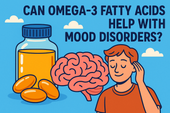
Can Omega-3 Fatty Acids Help with Mood Disorders?
Omega-3 fatty acids do more than support heart health — they can help balance mood, reduce depression, and calm anxiety. Discover how EPA and DHA nourish your brain, fight inflammation, and support emotional well-being from within. 🌊🧠
-

Vitamin D and Mood: The Sunshine Vitamin for Emotional Balance
Could the key to emotional balance be as simple as a little sunlight? Discover how vitamin D — the sunshine vitamin — influences serotonin, reduces inflammation, and helps you feel more positive and resilient year-round. ☀️💛
-

The Role of Magnesium in Reducing Irritability and Low Mood
Feeling on edge or emotionally drained? Magnesium could be the missing link between your body and your mood. Discover how this essential mineral reduces irritability, balances neurotransmitters, and helps your nervous system find calm again. 🌿✨
-
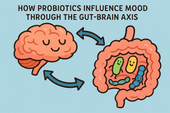
How Probiotics Influence Mood Through the Gut-Brain Axis
Discover how probiotics can do more than support your digestion—they can actually uplift your mood. This article explores the fascinating gut-brain axis and how balancing your gut bacteria through probiotics may help reduce anxiety, improve emotional stability, and support long-term mental well-being. 🌿🧠
-
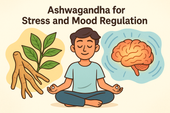
Ashwagandha for Stress and Mood Regulation
Discover how Ashwagandha, the powerful adaptogenic herb 🌿, helps your body manage stress and regulate mood. Learn how it balances cortisol, boosts GABA and serotonin, and supports emotional stability — helping you feel calm, focused, and resilient every day.
-
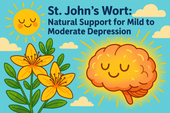
St. John’s Wort: Natural Support for Mild to Moderate Depression
Discover how St. John’s Wort, the “sunshine herb” 🌼, naturally supports mild to moderate depression. Learn how it boosts serotonin, balances mood, and promotes emotional resilience — with research showing its effectiveness compares to antidepressants, but with fewer side effects.
-
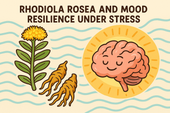
Rhodiola Rosea and Mood Resilience Under Stress
Discover how Rhodiola rosea helps your body adapt to stress 🌿. Learn how this powerful adaptogen balances cortisol, supports serotonin and dopamine, and strengthens emotional resilience — helping you stay calm, focused, and energized under pressure.
-

Chamomile and Lavender: Herbal Calm for Emotional Fluctuations
Discover how chamomile and lavender bring calm to emotional ups and downs 🌿. Learn how these two soothing herbs balance your nervous system, ease anxiety, and support restful sleep — naturally helping you find peace and emotional stability.
-
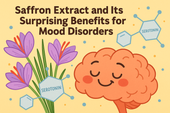
Saffron Extract and Its Surprising Benefits for Mood Disorders
Discover how saffron extract — the golden spice of joy 🌸 — can naturally support mood balance, ease anxiety, and lift mild depression. Learn what science says about its serotonin-boosting power, the ideal dosage, and how this ancient remedy compares to modern antidepressants.
-
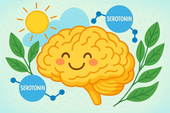
5-HTP and Serotonin: A Natural Path to Lifting Mood
Discover how 5-HTP naturally boosts serotonin 🌞 — the neurotransmitter behind mood, sleep, and emotional balance. Learn how this plant-derived compound supports happiness, reduces anxiety, and improves rest by helping your brain create more serotonin the gentle, natural way.
-
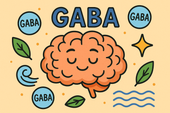
GABA Supplements for Reducing Anxiety and Mood Swings
Discover how GABA supplements can help reduce anxiety and balance mood naturally 🌿. Learn how this calming neurotransmitter works to quiet the mind, ease stress, and improve sleep — plus which nutrients and habits can boost your body’s own GABA production for long-term emotional stability.
-
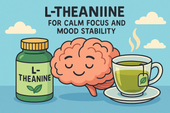
L-Theanine for Calm Focus and Mood Stability
Discover how L-theanine, the calming compound found in green tea 🍵, promotes focus, relaxation, and mood stability. Learn the science behind how it balances neurotransmitters, reduces stress hormones, and enhances clarity — helping you stay centered, calm, and productive without sedation.
-
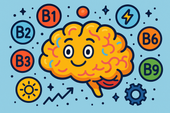
B Vitamins and Brain Chemistry: Supporting Energy and Emotional Balance
Discover how B vitamins power your brain chemistry ⚡. Learn how B6, B9, and B12 support serotonin, dopamine, and energy production — helping boost focus, mood, and emotional balance. From diet to supplements, explore how this vital nutrient group keeps your mind resilient and your energy steady.
-

N-Acetyl Cysteine (NAC) and Mood Disorders: What the Research Says
Learn how N-Acetyl Cysteine (NAC) supports brain health and mood balance 🧠. Discover how this antioxidant helps reduce oxidative stress, regulate glutamate, and improve emotional stability in depression, bipolar disorder, and anxiety — backed by cutting-edge psychiatric research.
-

Supplements for Bipolar Disorder: What May Support Stability
Discover the best supplements for bipolar disorder 🌿 that may support emotional stability and brain health. Learn how nutrients like omega-3s, magnesium, vitamin D, and NAC can help reduce inflammation, balance neurotransmitters, and complement traditional treatment safely.

















































